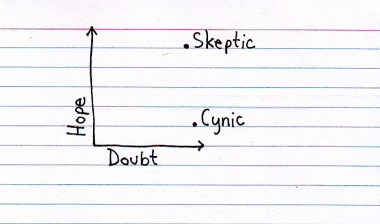 (From Mahablog) I'm pleased it passed. It doesn't fix everything that's wrong with health care in this country, but it does look as if it will fix some of the problems. As always, I'm finding both positive and negative reactions in the progressive blogosphere, and have read many second-hand reports of apocalyptic exploding heads across the right side of the spectrum. My reaction was captured pretty well in "We Shall See," at Indexed this morning:
(From Mahablog) I'm pleased it passed. It doesn't fix everything that's wrong with health care in this country, but it does look as if it will fix some of the problems. As always, I'm finding both positive and negative reactions in the progressive blogosphere, and have read many second-hand reports of apocalyptic exploding heads across the right side of the spectrum. My reaction was captured pretty well in "We Shall See," at Indexed this morning: I don't know if this was intended as her response to HCR, but it's appropriate. Reuters has a nice summary of what happens if and when the bill is signed into law:
I don't know if this was intended as her response to HCR, but it's appropriate. Reuters has a nice summary of what happens if and when the bill is signed into law: WITHIN THE FIRST YEAR OF ENACTMENTand that's just the first half of the items that go into effect this year. Another benefit is that we can all mock Rush Limpdick when he backpedals on his threat to move to socialist Costa Rica; the good folks at BuzzFeed have already started the festivities.
*Insurance companies will be barred from dropping people from coverage when they get sick. Lifetime coverage limits will be eliminated and annual limits are to be restricted.
*Insurers will be barred from excluding children for coverage because of pre-existing conditions.
*Young adults will be able to stay on their parents' health plans until the age of 26. Many health plans currently drop dependents from coverage when they turn 19 or finish college.
*Uninsured adults with a pre-existing conditions will be able to obtain health coverage through a new program that will expire once new insurance exchanges begin operating in 2014.
Rush Limbaugh promised that if health care reform passed, he would move to Costa Rica. Now you can donate $1 to buy Mr. Limbaugh a one-way ticket. If he changes his mind, the proceeds will be donated to Planned Parenthood.A Ticket For Rush!
 Now this is all very nice, but Numballs is our creation, our fault, and our problem. If I were Costa Rican, I would regard our allowing him to flee to that country as an act of war. I would also have very little fear that Rushputin would actually choose to do so.
Now this is all very nice, but Numballs is our creation, our fault, and our problem. If I were Costa Rican, I would regard our allowing him to flee to that country as an act of war. I would also have very little fear that Rushputin would actually choose to do so.Still, I feel like this bill is in large part a sell-out to corporate interests who have demonstrated repeatedly how much they enjoy the flavor of human blood. I'd like to be hopeful. But I'm not, really. My brother loves to talk about Friedman's visions of free-market paradise, and how serving the interest of the customer is always in a corporation's best interest. Talk about regulation, and he'll tell you it's pointless; a determined player will always be able to find a way to game the system. I agree. The problem is we have shown repeatedly over the last decade that to make the big bucks, you have to act in exact opposition to the above themes: work behind closed doors to figure out how to squeeze maximum profits for minimum value, and let the customers and taxpayers clean up the debris, or die trying, in the aftermath. And forget gaming the system; our current idea of regulation is pretty much, what the corps want, the corps get.
So in the end, I'm neither terribly pessimistic nor optimistic. I just don't know, and I trust politicians, corporations and pundits as far as I can throw air.
Followup, 12:10 PM: Heh. It's an unusual day when my sentiments are more in line with Ross Douthat than with Paul Krugman. Though the latter piece is more about the nature of the partisan process, and the former more about the consequences- the actual results of the policy- so it's kind of comparing apples and oranges. But Douthat's comments are closer to what I'm actually thinking, and I really, really appreciated this line:
As a conservative, I suspect they’re wrong. But now that the bill has passed, as a citizen of the United States, I dearly hope they’re right.Followup 2, 12:40 PM: Der Speigel has an interesting take from the outside:
The debate will dominate the next few months -- and will no doubt also have an impact on the other projects that Obama is finally planning to tackle. The attention that the president will have to continue to pay to health care, in fact, makes further successes that much more doubtful.
Every other issue has become a sideshow, particularly those outside the borders of America. The Afghanistan mission: of marginal interest. Protecting the environment: postponed. Peace in the Middle East: off in the distance. Sanctions against Iran: delayed. Europe: not even worth a trip.
The one remaining global superpower has succumbed to navel gazing.










No comments:
Post a Comment